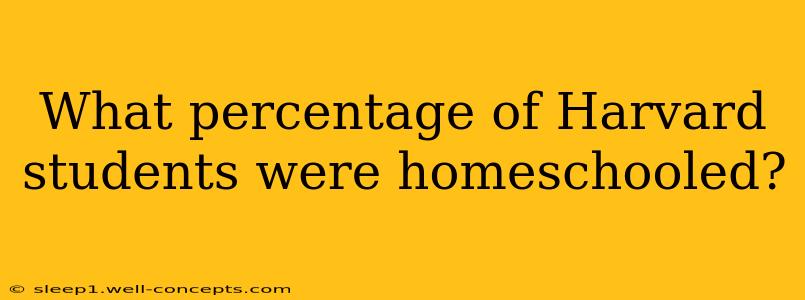Unpacking the Mystery: Homeschooling and Harvard Admissions
The question of what percentage of Harvard students were homeschooled lacks a readily available, definitive answer. Harvard University, like many prestigious institutions, doesn't publicly release data specifically broken down by homeschooling status within its student body demographics. This is primarily due to privacy concerns surrounding student information.
However, we can explore this topic by examining related information and drawing some reasonable inferences:
The Landscape of Homeschooling in Higher Education
While precise figures for Harvard remain elusive, we know that homeschooling, as an educational approach, is growing in popularity. This rise in homeschooling means a proportionally larger number of homeschooled students are applying to and being accepted into universities across the US, including Ivy League institutions like Harvard.
It's crucial to understand that Harvard's admissions process is incredibly competitive and holistic. Admission isn't solely based on the type of schooling a student received but rather on a comprehensive evaluation of their academic record, extracurricular activities, essays, recommendations, and demonstrated potential. A homeschooled applicant needs to demonstrate comparable achievement to traditionally schooled applicants to be competitive. This often involves rigorous independent study, participation in external enrichment programs, and strong standardized test scores (though Harvard is test-optional).
Factors Influencing the Numbers
Several factors make pinpointing the percentage of homeschooled Harvard students difficult:
- Data Privacy: Harvard, like other universities, protects student privacy. Detailed breakdowns of student backgrounds are not publicly released.
- Self-Reporting Inaccuracies: The accuracy of self-reported homeschooling data on application forms can vary.
- Definition of "Homeschooling": The definition of homeschooling itself can be broad, encompassing various levels of parental involvement and educational approaches.
Instead of a Percentage, Consider This:
Instead of focusing on a specific percentage, which is currently unobtainable, it’s more productive to acknowledge that homeschooled students are accepted into Harvard and other top universities. Their success highlights the fact that a rigorous, well-structured homeschool education can absolutely prepare students for the challenges of a highly selective institution. The focus should be on the quality of the homeschooling experience, not just its existence.
Future Research and Trends
As homeschooling continues to grow, we can anticipate more research emerging on the educational pathways and college outcomes of homeschooled students. This future research may provide more granular data on the representation of homeschooled students at elite institutions like Harvard. For now, however, the precise percentage remains unknown.
In conclusion: While we can't offer a specific percentage of Harvard students who were homeschooled, the success of homeschooled applicants demonstrates that a well-planned and executed homeschool curriculum can lead to acceptance at the most prestigious universities. The key is to focus on academic rigor, personalized learning, and active engagement in enriching extracurricular opportunities.

